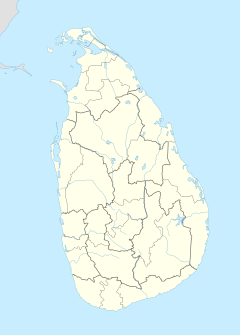Empire Hotel, Kandy
| Olde Empire Hotel | |
|---|---|
 | |
| General information | |
| Location | Kandy, Sri Lanka |
| Address | 21 Temple Street, Kandy, Sri Lanka |
| Coordinates | 7°17′37.17″N 80°38′20.07″E / 7.2936583°N 80.6389083°E |
| Opening | 27 December 1898 |
| Technical details | |
| Floor count | 2 |
| Other information | |
| Number of rooms | 14 |
| Number of restaurants | 1 |
| Website | |
| http://www.oldeempirehotel.com/ | |
The Empire Hotel, Kandy or Olde Empire Hotel, is a small two-storey heritage hotel located on Temple Road in the Kandy city centre.
The hotel is located opposite the park/garden (Mahamaluwa) of the Temple of the Sacred Tooth Relic (Sri Dalada Maligawa), adjacent to Queens Hotel and the former Kandy court complex.
The hotel was opened on 27 December 1898 by Porolis C. Fernando[1] and it has been operated by the Fernando family ever since. The building was originally built in 1857 as a coffee factory (kopi kale) before being converted to a hotel.[2] In 1998 it was designated as a 'Conserved Building' by the UNESCO as part of the listing of Kandy as a World Heritage City.[3][4]
On 8 July 2005 it was formally included as an 'Archaeological Protected Monument' by the government.[5]
The Victorian-style building, features three white stone arches on the ground floor, with an open verandah and cast iron balustrades on the first floor, supported by four stone doric columns, and a half round tile roof.[6] The entire upstairs floor has polished wooden floorboards on timber beams. The upstairs verandah commands a view over Kandy Lake[7] and provides a viewing platform for guests to watch the Kandy Esala Perahera.
The hotel was used as a pub in the 1940s/50s but was converted by the owners into a guest house/budget hotel in the 1970s.
It has 14 bedrooms upstairs, with the entrance being from Colombo Road at the back of the building. The hotel has communal bathrooms for guests.[8][9]
In July 2010 the hotel caught fire, sustaining damage to the upper floor and roof.[10] It was subsequently repaired and restored.
In January 2014 Manor House Concepts took over the lower floor of the building and renovated the two downstairs dining rooms into a single café, fronting Temple Street.[11][12]
See also
[edit]References
[edit]- ^ Wright, Arnold, ed. (1999). Twentieth Century Impressions of Ceylon: Its History, People, Commerce, Industries, and Resources. Asian Educational Services. p. 695. ISBN 9788120613355.
- ^ Karunaratna, Nihal (1999). Kandy, Past and Present, 1474-1998 A.D. Central Cultural Fund, Ministry of Religious and Cultural Affairs. p. 265. ISBN 9789556131215.
- ^ Seneviratna, Anuradha; De Silva, Nimal (1999). World Heritage City of Kandy, Sri Lanka: Conservation and Development Plan. Central Cultural Fund. ISBN 9789556131260.
- ^ Fernando, Hiranthi (13 June 1999). "Kandy conserved". The Sunday Times. Retrieved 21 November 2019.
- ^ "Gazette". The Gazette of the Democratic Socialist Republic of Sri Lanka. 1401. 8 July 2005.
- ^ "The Project for Formulation of Greater Kandy Urban Plan (G". Chapter 10 - Present Condition of the Heritage Area. Japan International Cooperation Agency: 10–6. September 2018.
- ^ Bardsley, Danile (21 March 2005). "Green delights of Sri Lanka". Gulf News. Retrieved 21 November 2019.
- ^ Ellis, Royston (2011). Sri Lanka. Bradt Travel Guides. p. 110. ISBN 9781841623467.
- ^ Bradnock, Robert; Bradnock, Roma (1998). Sri Lanka Handbook. Passport Books. p. 208.
- ^ Wimalasurendre, Cyril (1 August 2010). "Olde Empire catches fire; tourists have narrow escape". The Island. Retrieved 21 November 2019.
- ^ "The Empire Cafe". Time Out Sri Lanka. BT Options. Retrieved 21 November 2019.
- ^ "Empire Cafe". Yamu. 2014. Retrieved 21 November 2019.

